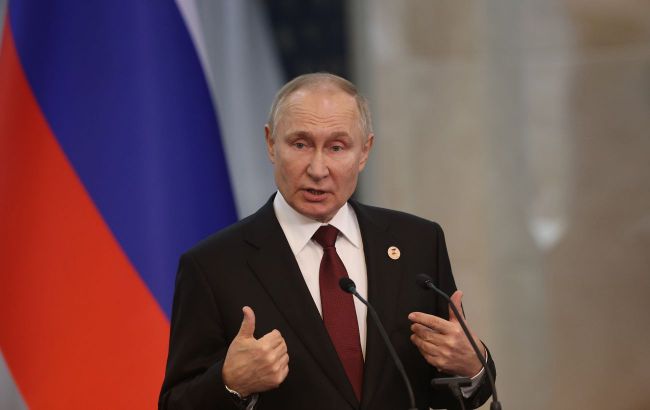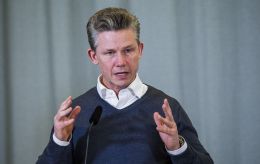Putin's attack preparations: Move for revenge or a different strategy?
 Photo: Russian President Vladimir Putin (Getty Images)
Photo: Russian President Vladimir Putin (Getty Images)
Despite the massive air attacks by Russia against Ukraine, the US believes this is not yet the “retribution” the Kremlin threatened following Operation Spiderweb. President Vladimir Putin is convening the Security Council, while his propaganda continues to escalate the rhetoric of revenge.
What the Kremlin leader is planning and why his recent attacks have targeted western Ukraine — read the full analysis below from RBC-Ukraine.
Key questions
-
Has Russia truly not yet launched its "retaliatory strike" for Operation Spiderweb?
-
Why has Russia targeted air strikes on western Ukraine?
-
Why is Putin convening the Security Council this week specifically?
-
Is a full mobilization in Russia possible, and how is it connected to the Security Council?
-
What is the US saying about Russia’s recent attacks on Ukraine?
-
How are satellites helping the enemy identify targets?
Russia has increased the number of air strikes against Ukraine following a successful and unprecedented Security Service of Ukraine (SBU) attack on Russian military airfields. The latest enemy attacks have been more frequently aimed at western regions of Ukraine. For example, on June 6, the cities of Lutsk and Ternopil were shaken by massive drone and missile strikes. And last night, June 9, Rivne region experienced the largest attack to date.
Dozens of drones and missiles targeted the region, including the city of Dubno, near which an airfield is located. Colonel Yurii Ihnat, head of communications for the Air Forces, reported that one of the main targets of Russia’s strike last night was an operational airfield.
In total, on the night of June 9, Russia launched a record number of air attack targets across Ukraine — 499 drones and missiles were fired.
In response, Ukraine’s air defenders intercepted 479 targets, including all four Kinzhal hypersonic missiles launched by Russia.
"A massive strike. One of the largest Russia has carried out against our country recently. The main blow was directed, as is being discussed publicly, at one of the operational airfields, which was attacked by the enemy. Thus, the enemy delivered air strikes by various means last night," Ihnat said during a national telethon live broadcast.
Is the enemy targeting western Ukraine?
Military expert Ivan Stupak explained why Russian forces are directing their drones and missiles at the western regions of Ukraine.
"Why the western regions? Because Russia clearly and logically understands that Ukraine is hiding its equipment, ammunition, and production facilities somewhere there," the expert said.
He explains that such deployment of equipment or weapons would not take place in Kharkiv or Dnipropetrovsk regions, as those areas are constantly under attack. Therefore, these assets must be located far from the front line.
“Kropyvnytskyi, Ternopil, Khmelnytskyi, Ivano-Frankivsk — places far away. They understand this, so their agents on the ground reveal information, which then leads to strikes in those areas. The Russians also calculate some targets themselves, for example, using satellite imagery. They buy satellite data,” Stupak said.
According to the expert, this may involve satellites capable of detecting heat, including thermal radiation from objects, such as industrial activity. For instance, production that takes place at night can be seen as heat flashes.
"Or, for example, a satellite flew over the Ternopil region and noticed that on the territory of an old collective farm, there are military crates stored in one of the hangars. That’s it — they mark it as a location where Ukraine has something. This is essentially how they operate," Stupak added.
Is Russia launching massive attacks, but still not its promised revenge?
After the unprecedented Operation Spiderweb by the Security Service of Ukraine on June 1, which destroyed 41 aircraft at Russian airfields, the enemy began talking about a “response.”
Russian President Vladimir Putin told then-US President Donald Trump that he was "forced to respond" to the Ukrainian strike on Russian airbases. Western media reported that Moscow might be preparing a severe strike on Ukraine, potentially targeting energy infrastructure and other critical assets.
However, as Reuters reports, the US believes that Russia’s recent strikes on Ukraine are not the "retaliatory strike" Trump warned about after his conversation with Putin. At the same time, Washington assumes that the retaliation strike could come in the next few days, though the exact date remains unknown. Military expert Ivan Stupak agrees with this assessment.
"Let me explain why. The last time they ‘avenged’ us for the Kursk region, they launched a massive strike, and almost all Russian officials publicly declared it an ‘act of retribution.’ Many users in the Russian internet segment rejoiced. After that, the dissatisfaction among Russians regarding the Ukrainian forces entering Kursk simply disappeared," he recalls.
According to the expert, the Kremlin leadership has not yet achieved such an effect with the recent strikes, so they now need to channel the public dissatisfaction caused by Ukraine’s Operation Spiderweb.
"I’ve seen posts from ordinary Russians unhappy about the strikes. The Kremlin sees this, so they believe they need to continue these attacks, and later claim that those were also ‘retribution’ strikes, to appease the Russian people. But even after that happens, it won’t mean the attacks will stop. It will mean that this ‘chapter’ is closed," Stupak noted.
Putin to convene 'major' Security Council meeting. What could it mean?
Over the weekend, pro-Kremlin sources announced that Russian President Vladimir Putin is set to convene a “major” meeting of the Russian Security Council later this week.
While the official agenda has not been released, Russian propagandists claim the session will address Russia’s “response” to recent Ukrainian attacks on airfields. Some analysts have even speculated that the meeting could be used to announce a large-scale mobilization in Russia.
"There’s some panic among people that Russia might announce total mobilization. I don’t think that’s the case. Russians love grand gestures — at least, that’s what I’m seeing now," says military expert Ivan Stupak. "Remember a few months ago, Putin held a late-night press conference. Everyone expected a big announcement, but in the end, he said something vague, and it all amounted to nothing. That whole press conference went nowhere. This might just be part of a performance for Donald Trump — a way to say, ‘Look, we’re planning something.’"
According to Stupak, intimidation itself is part of the Kremlin’s strategy. Moscow could be hyping up the narrative to create the illusion that its retaliation against Ukraine will be massive and devastating.
"Well, we’ll see what happens. I don’t want to scare anyone — in fact, I often try to calm people down. But this is Russia. And we mustn’t forget: even if they plan something, they can change it at the very last moment. The agenda could be one thing today and then suddenly switch to something completely different. Anything is possible," the expert concluded.
Meanwhile, Ukrainian President Volodymyr Zelenskyy urged citizens to stay alert during his traditional evening address on Sunday.
"I thank everyone who is fighting for Ukraine, and everyone who works for our state and our people. And be sure to pay attention to air raid alerts these days. Please take care of yourselves," the president said.
Sources: data from the Ukrainian Air Force, the Security Service of Ukraine (SBU), Reuters material, pro-Kremlin media, and an exclusive comment from military expert Ivan Stupak.

